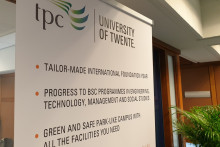The society for universities VSNU is disappointed when it calls scientific education 'an entry to balance the books'. Not a lot of news for the universities is included in the 'miljoenennota', next year's national budget. In 2002 the universities will get more than 2.7 billion euro from the government, a slight increase with regard to this year (2.5 billion). The University of Twente can expect 124.5 million euro in the coming year, an increase of 10%.
The extra money is hardly meant for new investments in education or research. Almost all will go to extra tasks imposed on universities. For example, in 2006 the universities' teacher training courses will have to supply twice the number of teachers they do now. All programmes will get a minimum of one educational graduation variant in 2002. To that end 4.7 million euro is made available.
The universities not only have a role to play in reducing the teacher shortage, problems in health care also have to be solved partially by academia. The increase in the number of places for students of medicine and dentistry will cost Hermans just 5 million euro in 2002, but the amount will have risen to 54.2 million by 2008. According to current agreements 2400 students will have to find a place at universities in 2004.
Wage and price increases are the biggest items on the budget. To that end Hermans makes 127.7 million euro extra available structurally. For the increase in student numbers he gives another 20 million.
In addition, 2002 shows 22.7 million euro for the introduction of the bachelor-master model and 32.3 million euro to improve employment conditions especially for young scientists. A quarter of scientific personnel will retire in the coming seven years, at a time when universities have difficulty drawing in young people.
For research policy the secretary reserves more than 768 million, 14 million more than last year. More money is spent on genetics research in particular: over 56 million euro. This area of research is a spearhead in science policy. In July already research financier NWO received more than 400 million guilder to distribute among 'genomics'-researchers.
The ministry for Economic Affairs (EZ) will contribute substantially to life sciences through the infrastructure-fund ICES. EZ, moreover, wants to stimulate transfer and application of knowledge by subsidising 'techno starters', young innovative companies that are set up in co-operation with universities and other knowledge institutes.
In a first response the universities show themselves disappointed. Although an end has come to years of cutbacks, a substantial investment is needed according to the VSNU. Did the cabinet not announce recently that the Netherlands wants to be a 'high-grade knowledge society' by 2010? This is why the society, through chairman Ed d'Hondt, asked for a billion guilder extra annually at theopening of the academic year.







